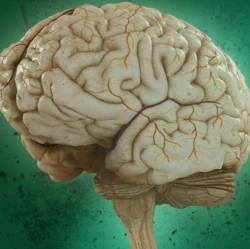
Prion diseases are a rare class of brain disorders that are transmissible. A newly described addition to the prion diseases, Shy-Drager syndrome (SDS) or multiple system atrophy (MSA), has many features in common with Parkinson’s disease.
Many of the neurodegenerative diseases of the ageing brain are associated with the accumulation and deposition of specific proteins. It has long been suspected that neurodegenerative diseases in general may all ultimately be caused by this process of proteins getting caught in the wrong process, and misfolding.
This misfolding sets off a cascade of events: the proteins oligomerise (a number of identical molecules join together); accumulate; nucleate (form a nucleus or centre); polymerise (combine to build a structure with its components); self-replicate; and eventually, propagate and spread throughout the brain. Many of these protein changes also occur in the usual food cooking process (aggregation of proteins caused by heating) or food preparation (the solidification of proteins in the refrigerator).
Scientists have always kept, and still do, an open mind about whether Alzheimer’s disease and other neurodegenerative conditions are transmissible. We’ve known since the early 1960s that amyloid fibrils, the accumulations of Aβ-amyloid in the brain, are self-propagating entities.
In diseases involving amyloid protein, the “amyloid enhancing factor”, which causes the disease to progress, is thought to be amyloid itself. In other words, the amyloid is self-replicating and makes copies of itself exponentially.
As a precautionary measure, the authors of the paper warn we should now take additional safety precautions in the neurosurgical clinics where deep brain stimulation is used to control the tremors caused by Parkinson’s disease. Because of the overlap in symptoms and signs of Parkinson’s with SDS/MSA, it’s likely that some people with the newly described disease have been treated by deep brain stimulation.
It’s important to ensure that cross-contamination of neurosurgical equipment doesn’t occur because we don’t want to inadvertently transmit a disease between humans. Using disposable stimulation electrodes, for instance, will be mandatory in the future. Similar concerns have already been raised about other neurodegenerative illnesses, such as diseases involving misfolded tau protein, which cause frontotemporal dementia.
